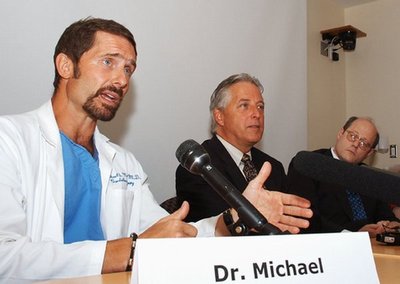August 16, 2007
UWMC performs adult heart-lung transplant
By Elizabeth Lowry & Marsha Rule
News & Community Relations
Surgeons at the UW Medical Center performed Seattle’s first adult heart-lung transplant on 30-year-old Patrick Farris of West Richland, Wash., on Aug. 6. Farris suffered from cystic fibrosis and familial cardiomyopathy.
His sister, Maria Wray, 32 also received a heart transplant at UWMC. She was diagnosed with familial cardiomyopathy 14 years ago. When she became pregnant two years later she was treated by UWMC physicians and gave birth to her son Kyle at UWMC. Seven years after the birth of her son, Wray had a heart transplant at the medical center.
Farris was diagnosed with cystic fibrosis when he was 17 and diagnosed with familial cardiomyopathy after his sister’s diagnosis. Although he played football in high school, Farris was unable to walk without oxygen and great effort prior to the landmark surgery.
Among Farris’ team of UWMC physicians were Drs. Edward Verrier, chief of cardiothoracic surgery; Michael Mulligan, cardiothoracic surgery; Daniel Fishbein, medical director of the UWMC heart transplant program; Mark Tonelli, UWMC pulmonologist; and Gordon Cohen, chief of congenital heart surgery at Children’s Hospital and Regional Medical Center.
Speaking at a news conference last week, Mulligan said the more than five-hour surgery was a success and that Farris was recovering “fabulously well —- Patrick is off oxygen, is eating and comfortable, and is on no medications to support his heart or blood pressure.” Mulligan said he expected Farris to be discharged from the hospital within 10 days.
Mulligan noted that although this was UWMC’s first adult heart-lung transplant, the first one was done in 1981 at Stanford University and the operation was subsequently performed in Spokane.
UW Medical Center is an experienced pioneer in transplantation. The medical center’s transplant program was founded in 1959. The first kidney transplant in the region took place at UWMC in 1968; first heart transplant in 1985; first liver transplant in 1990; first pancreas-only transplant in 1991; and first lung transplant in 1992. The medical center has the only lung transplant program in the Pacific Northwest and is one of the largest in the United States.
One-year survival rates for heart, lung and kidney transplants performed at UWMC are well above national averages at 87 percent, 78.5 percent and 99.44 percent, respectively.
Making transplant services available to people in the Northwest is critical as more people need them due to advanced and end-stage organ disease. Mulligan strongly encouraged people to become organ donors.
Speaking for the Farris family, Wray expressed her deep gratitude for the quality of care both she and her brother received “from everyone from the doctors to people in the cafeteria, they have all been so nice.”
“I know Patrick is looking forward to playing with his dogs and tossing the football again with his nephew, Kyle,” Wray said.
More than 96,000 people nationwide are waiting for organs; 1,503 people in Washington need organs. Eighteen people die each day waiting for a transplant. One organ donor can save or enhance the lives of more than 50 people.
LifeCenter Northwest facilitates the recovery, preservation and allocation of organs in Washington, Montana, Alaska and Northern Idaho. For more information about organ donations, visit www.lcnw.org.

